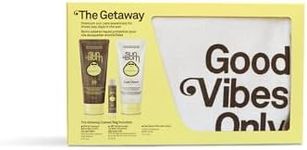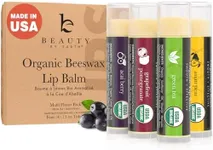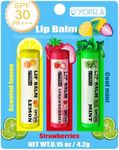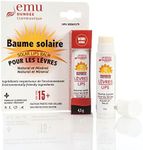Buying Guide for the Best Lip Sunscreens
Choosing the right lip sunscreen is important because the skin on your lips is delicate and more prone to sun damage than other parts of your body. A good lip sunscreen not only protects you from harmful UV rays but also keeps your lips moisturized and comfortable. When shopping for a lip sunscreen, it's helpful to understand the key features that make one product better suited for your needs than another. By focusing on the most important specifications, you can find a product that fits your lifestyle and keeps your lips healthy.SPF RatingSPF stands for Sun Protection Factor, and it measures how well the sunscreen protects your lips from UVB rays, which are the main cause of sunburn. The higher the SPF number, the more protection you get. SPF values for lip sunscreens usually range from 15 to 50. SPF 15 offers basic protection for everyday use, while SPF 30 or higher is better for extended outdoor activities or intense sun exposure. If you spend a lot of time outdoors, especially during peak sun hours, choose a higher SPF. For quick errands or minimal sun exposure, a lower SPF may be sufficient.
Water ResistanceWater resistance indicates how well the lip sunscreen stays on your lips when you are sweating, swimming, or drinking. Some lip sunscreens are labeled as water-resistant for 40 or 80 minutes, meaning they will continue to protect you for that amount of time even if your lips get wet. If you plan to be active outdoors, swim, or sweat, look for a water-resistant formula. If you mostly need protection for daily activities, water resistance may be less important.
Moisturizing IngredientsMoisturizing ingredients like shea butter, coconut oil, or vitamin E help keep your lips soft and prevent them from drying out. Some lip sunscreens focus more on sun protection and less on hydration, while others combine both. If your lips tend to get dry or chapped, look for a product with added moisturizers. If you already use a separate lip balm, you might prioritize sun protection over extra hydration.
Type of Sunscreen (Chemical vs. Mineral)Lip sunscreens use either chemical or mineral (physical) filters to block UV rays. Chemical sunscreens absorb UV rays, while mineral sunscreens (like zinc oxide or titanium dioxide) sit on top of the skin and reflect them. Mineral sunscreens are often preferred for sensitive skin and provide broad-spectrum protection, but they can sometimes leave a white cast. Chemical sunscreens are usually clear and lightweight. If you have sensitive skin or want a more natural option, choose a mineral sunscreen. If you prefer a clear finish, a chemical sunscreen might be better.
Flavor and ScentLip sunscreens come in a variety of flavors and scents, from fruity to minty to unscented. Some people are sensitive to fragrances or flavors, which can cause irritation. If you have sensitive lips or dislike strong scents, look for unscented or hypoallergenic options. If you enjoy a pleasant taste or smell, you can choose a flavored or scented product that makes application more enjoyable.
Texture and FinishThe texture and finish of a lip sunscreen affect how it feels and looks on your lips. Some are glossy, some are matte, and others are more like a traditional balm. Glossy finishes can be more moisturizing but may feel sticky, while matte finishes are less noticeable but might be less hydrating. If you like a natural look, go for a matte or clear finish. If you want extra shine or moisture, a glossy formula may be best.
















